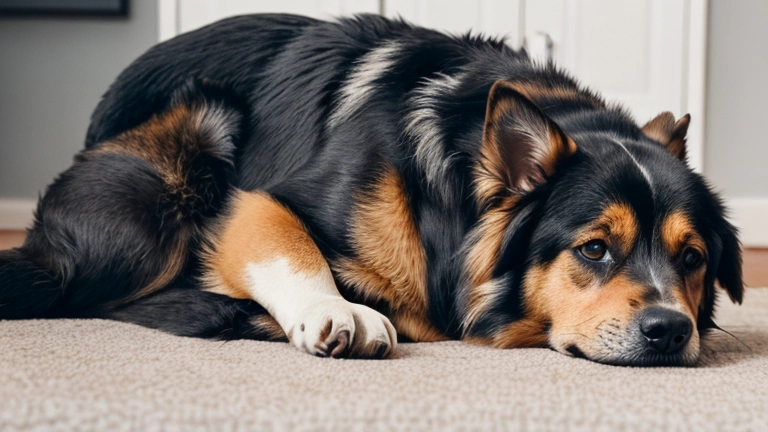Table of Contents:

INTRODUCTION
Nothing is more hurtful than thinking why is my dog’s stomach gurgling like a distant hurricane when they refuse to eat. I’m sure you’re doubting what’s happening and if I should surprise out. At least take a moment to relax. It may only be a little digestive problem at times, but other times it may require more important care.
This controller breaks it all down for you. From guessing out whether the sounds are normal to finding when you should call the vet, we’ll cover everything you need to know. By the end, you’ll feel prepared (and a little less freaked out) about what’s going on with your furry friend.
Why Is My Dog’s Stomach Gurgling?

Connection Between Loud Noises and Not Eating
When your dog’s stomach sounds like a stuff band and they’re skipping meals, it’s likely because their gut is out of sync. These sounds, called borborygmi (try saying that three times fast), happen when gas and fluids move through their insides.
It could be hunger—a blank stomach can make gurgling sounds louder. Or, your pup may have eaten something their tummy didn’t approve with, causing digestive disturbance. If they’re not eating, it might mean they feel too uncomfortable to food down.
Rate and Volume of Stomach Noises
How often is the gurgling happening? If it’s chance and quiet, it’s maybe nothing to care about. But if the sounds are loud and normal, it’s value paying closer care. Determined or risky gurgling can signal an underlying issue, like gas collection or even something more thoughtful like gastrointestinal pain.
Observing Additional Symptoms of Discomfort
Gurgling alone isn’t always cause for fear, but when it’s balancing with other symptoms, it can be a sign that something’s up. Look out for these red flags:
Tiredness:
Is your usually springy dog suddenly acting like they’ve had a long day at the office?
Vomiting or Diarrhea:
These aren’t just disordered; they’re major needles of stomach care.
Bloating:
An inflamed belly can mean gas collection—or worse, bloat, which is a life-aggressive reserve.
Restlessness or Whining:
Your dog may be trying to tell you they’re not feeling their best. If you notice any of these along with the gurgling, it’s time to study further (or call the vet).
Potential Causes of Gurgling Noises and Loss of Appetite
When your dog’s stomach sounds like a washing machine on the fritz, it’s natural to miracle, why is this trendy? There’s no single answer, but these are some of the usual mistrusts:
Hunger and Feeding Times
Sometimes, the simplest answer is the correct one: your dog might just be hungry. When their stomach is blank, it shakes air and digestive liquids, creating those loud barks. Think of it as their body saying, “Hey, where’s the food?”
That said, if they’re not eating despite hunger signs, something might be off. Maybe they’re worried, touch unwell, or simply being particular. Try present their favorite meal or a tasteless option like boiled chicken to see if it gets them attracted.
Dietary Indiscretion
Dogs are little travelers—sometimes to their loss. Whether it’s uneasy a bite of last night’s remains or eating on chance items, their interested tastes can do disorder.
Dietary indiscretion (a upmarket way of saying “they ate something they shouldn’t have”) is a common cause of belly gurgles and appetite loss. Oily foods, damaged leavings, or even non-food items can irritate their digestive area.
Parasites and Bacterial Infections
Stomach parasites, like lice, or bacterial infections can trouble your dog’s stomach in key ways. These scary-crawlies mess with digestion, leading to gas, loud stomach sounds, and sometimes looseness or vomiting. It’s like having an unwanted guest causing disorder!
Watch for signs like weight loss, a dull coat, or running. Your vet may recommend seat testing to confirm and advise treatment like dewormers or antibiotics. Learn more about bug control here.
Gastrointestinal Disorders and Diseases
Sometimes, an underlying sickness like pancreatitis, gastroenteritis, or inflammatory bowel disease (IBD) is the problem relatively than what your dog ate. These lasting or critical issues can make the digestive system hypersensitive, leading to loud gurgling, discomfort, and loss of appetite.
If the symptoms continue or worsen, don’t wait—book that vet visit. Early involvement makes a big difference.
Gas
Gas is a mean criminal behind those roars. It can come from allowing too much air (hello, fast eaters!) or from foods that are harder to abstract. In most cases, it’s innocent and resolutions on its own. But if it’s opposite with bloating or pain, it might be time to dig deeper.
Bloat in Dogs
Here’s the monster: bloat, also called gastric dilatation-volvulus (GDV), is an emergency. It happens when a dog’s stomach turns, deceiving gas and cutting off movement. Symptoms include loud gurgling, a expanded belly, and walking.
Bloat can become life-aggressive within hours, so if you suspect it, don’t wait—get your dog to the vet ASAP.
When Should You Call the Vet for Dog Stomach Gurgling?
As pet parents, it’s easy to play the guessing game: “Should I call the vet, or am I overplaying?” While chance belly crashes are usually meaningless, some situations demand direct care. Knowing when to act could save your furry friend’s life.
Red Flags Indicating the Need for Immediate Veterinary Care
Persistent Symptoms Lasting Over 24 Hours
If the gurgling sounds don’t disappear and your dog is still rejecting to eat, it’s time to study further. A day without food or relief can tension their body and hint at underlying issues like gastrointestinal disorders or infections.
Vomiting, Diarrhea, or Severe Bloating
- Gurgling attended by vomiting or diarrhea isn’t something to meeting off, especially if there’s blood involved. These symptoms can signal gastroenteritis, poisoning, or even bloat.
Plain bloating is a massive red flag—it could point to gastric dilatation-volvulus (GDV). This condition spirals fast and is life-aggressive. Don’t wait; get to the vet nearly.
Blood in Stool or Extreme Lethargy
Blood in the seat, whether bright red or remain black, can show internal bleeding or plain infection. Likewise, if your pup is unusually tired or unwilling to move, it might mean they’re in weighty discomfort or pain.
Signs of Dehydration
Dry gums, lower eyes, and a lack of give in the skin are signs your dog isn’t getting enough liquids. Dehydration can spiral into serious difficulties quickly, especially if diarrhea or vomiting is present.
How To Help Your Dog’s Gurgling Stomach
So, your dog’s stomach is low like foolish, and they won’t eat. It’s tense, right? But don’t worry; there are a few simple steps you can take at home to help settle things down. Let’s bar into what you can do to get your pup feeling better.
Immediate Actions and Home Remedies
When your dog’s belly starts roaring like foolish, the first thing you might want to do is provide them with food. But, hold off for a bit. Sometimes the best thing is to give their digestive system a rest.
Remove Food Temporarily
If your dog hasn’t eaten in a while, you might be curious to food them right away. However, an upset stomach or indigestion can make things worse. Try suppression food for 12 to 24 hours (but always make sure they have access to water). This allows their stomach to settle.
Offer Small Amounts of Bland Food
After the fast dated, introduce a tasteless diet. Something kind like boiled chicken and white rice is regularly easy on a searching stomach. Gradually restore their regular food once they’re back to eating without issue.
Encourage Hydration
A dry dog can feel worse, so make sure they have continuous access to fresh water. If they’re unwilling to drink, try present ice cubes or a little bit of low-sodium chicken soup to induce them.
Use Calming Treats
Is your dog worried or stressed? Worry can sometimes contribute to stomach problems, so if your pup’s digestion seems linked to stress, calming treats might be helpful.
Look for treats that hold natural fixings like chamomile, valerian root, or CBD. These fixings can help relax your dog and settle their stomach. If stress seems to be the issue, calming treats could work miracles in giving your dog some relief. Find more calming treat options here.
Don’t Let Your Dog Overeat
Overdoing can lead to bloating, extreme gas, and distress—resulting in more gurgling sounds. If your dog’s stomach is already troubled, make sure they don’t overeat.
Keep their meals small and normal rather than one large serving. This will help avoid additional pressure on their digestive system and make them feel more comfortable.
Preventing Future Stomach Issues and Eating Problems
Once your dog’s stomach settles, the last thing you want is to go through this again. While some stomach upsets are obvious, there are active steps you can take to reduce the chances of future belly troubles.
Gradual Diet Changes to Prevent Sensitivity
Dogs are beings of habit, and their digestive systems can be searching to swift changes. If you plan to change their food (whether to a new brand or flavor), don’t just switch it overnight. Doing so too quickly can lead to digestive troubled, including gurgling and loss of appetite. Learn more about transitioning your dog’s food here.
Key Takeaways
So, what’s the bottom line? Here’s the quick rundown:
- Gurgling stomachs and appetite loss are regularly linked to digestive troubled, pressure, or dietary rashness.
- Keep an eye on additional symptoms—if things don’t improve or get worse, a journey to the vet may be needed.
- There are some easy steps you can take at home, like present tasteless food and cheering hydration.
- Long-term, managing your dog’s diet, routine, and pest control can prevent future stomach issues.
FAQS
1. Why is my dog’s stomach gurgling so noisily and they’re not eating?
Loud stomach gurgling (known as borborygmi) can be caused by gas or liquids moving through the insides. If your dog isn’t eating, it could specify digestive worry, stress, dietary carelessness, or a more serious issue like an infection or gastrointestinal disorder. Monitor symptoms and contact your vet if the problem continues for over 24 hours.
2. When should I worry about my dog’s stomach gurgling?
While chance stomach gurgling is normal, you should worry if it’s attended by symptoms like vomiting, diarrhea, bloating, extreme lethargy, or loss of appetite permanent over a day. These could show conditions like stomach blockages, bloat, or infections that need fast vet attention.
3. How can I help my dog when their stomach is upset?
Start by coverup food for 6–12 hours to let their stomach relax, then offer small totals of mild food like boiled chicken and rice. Confirm your dog stays hydrated. Calming treats may help if pressure is a factor. Avoid overfeeding and screen their condition closely. If symptoms continue, consult a vet.
4. Can pressure reason my dog’s stomach to gurgle and lose appetite?
Yes, stress can upset your dog’s digestive system, leading to stomach gurgling and loss of appetite. Conditions like changes in monotonous, travel, or loud noises can activate worry. Calming treats, a quiet setting, and a consistent feeding list can help ease stress-related stomach issues. If the symptoms persist, check your vet to rule out other potential.
5. Can I give my dog tablet for stomach gurgling?
It’s best to avoid giving your dog any over-the-security tablet without checking a vet. Some tablets for humans can be harmful to dogs. Instead, focus on home remedies like offering tasteless foods, keeping them hydrated, and nursing symptoms. If your dog’s condition doesn’t improve or worsens, seek veterinary advice for proper diagnosis and treatment.

1 thought on “Panicked Over: Why Is My Dog’s Stomach Gurgling? 5 Reasons”